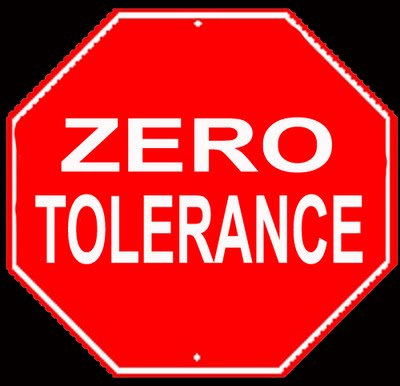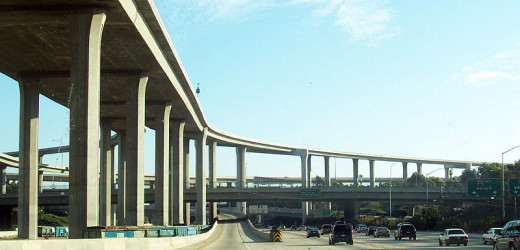Zero Tolerance - Nirvana for the Bureaucratic Mind

Zero tolerance means any policy, rule or set of guidelines that allows for no deviation from strict compliance. There is nothing to think about, no details to analyze, no weighing of options, no exceptions. No means no. Violate the zero tolerance dictum and you're in trouble, possibly big trouble.
Does Zero Tolerance Ever Make Sense?
It's easy to come up with a long list of scenarios where zero tolerance seems to make sense. Let's take a look at a few examples where zero tolerance looks like a good idea - until you come up with a few troubling hypotheticals.
· "No alcohol consumption within 18 hours of operating an aircraft." Who could argue the wisdom of such a policy? Flying a plane requires the keenest use of all your sensory and intellectual powers and should not be impaired by alcohol.
o But what about this scenario? You're an experienced off-duty pilot sitting in the passenger section of a plane having just polished off your second martini. Suddenly a panicked flight attendant shouts into the public address system: "Your attention please. The pilot and co-pilot have apparent food poisoning and they're both unconscious. Does anyone on the plane know how to fly?" Take your pick. An experienced pilot with a slight buzz or, well, nobody.
· "This school is a gun free zone, with the sole exception of law enforcement officials. No exceptions" There are a lot of schools in the United States with a zero tolerance policy like this, including the Sandy Hook school in Newton Connecticut, the scene of our nation's most horrifying mass murder by a crazed gunman.
o But what about this scenario? You're a private detective with a license to carry a concealed weapon, which you do by strapping on your Glock in a shoulder holster. You have absolutely no law enforcement authority. As you're driving by an elementary school you hear on the radio that there is a shooting in progress. You pull over and enter the school through a side doorway. You see an assailant firing a gun and immediately shoot him before he can claim any more victims. Are you a felon?
· "Only the principal or assistant principal of this school can call 911. No exceptions." It seems to be a good idea to centralize an important decision like this, no?
o But what about this scenario? Both the principal and assistant principal are away at a meeting. You're a teacher and one of your students suddenly drops to the floor having an obvious seizure. Will you get fired if you call 911? Possibly. This hypothetical is from an actual event which will be discussed below.
A Girls Almost Dies - Because Nobody has Authority to call 911
What school administrator would ever want his or her school to be on a list of schools considered dangerous At Jamaica High School in Queens, New York, someone noticed that assistant deans often called 911 in response to violent events. As a result, the school wound up on a list of dangerous schools. The principal sent out a one sentence instruction that said: “Deans are not permitted to call 911 for any reason.” No means no. Mariya Fatima, a ninth-grade student, suddenly suffered a stroke. Because of the principal's message, employees waited over one hour before calling for medical aid. The delay resulted in paralysis far beyond what would have occurred if help was called immediately. "For any reason" means zero tolerance. So the employees followed the rules, and the young girl is paralyzed as a result.
The Case of the Killer Canvas
Anyone who has ever had the pleasure of working with a local building department has experienced the insanity of strict rule enforcement. I know a guy who has a concession to operate a municipal golf course. He wanted to cover the driving range with canvas to enable golfers to use the range in the rain. At first glance this sounds like an excellent idea. Provide paying customers during the rain so that he and the municipality could enjoy more fees. Not so fast. A building department rule stated that all new structures be capable of withstanding winds of 120 MPH. He tried to argue that the “structure” was to be a simple frame consisting of pipes covered with canvas. If he neglected to roll up or remove the canvas before an oncoming hurricane, what's the big deal? How much damage could a piece of flying canvas inflict? But no. A structure is a structure, according to the code, and it must be able to withstand a hurricane. In a world free of zero tolerance, the building inspector would have realized that the guy's proposal wasn't contemplated by the rule, or he would have brought it to his supervisor for a ruling. But the inspector was not in charge: the building code was. One could argue, as bureaucrats the world over do, that strict rules and regulations remove arbitrariness. After all, we are a nation of law, not men. But no set of rules or laws can cover every contingency, and to remove on-the-spot decision making with zero tolerance idiocy turns people into robots.
Let the Building Fall Down - A Rule is a Rule
I was once Chairman of the Board of the Long Island Maritime Museum in West Sayville, New York. An issue that showed up at many a board meeting considered the safety of one of our prized structures, our small craft exhibit building. The problem was that weeds were entering the structure along its base and were growing up inside the building. The Museum is located on County owned property, and anything that happened at the museum was covered by County regulations. The building, once an airplane hanger, had a beautiful old classic design, and it was one of the most popular exhibits on the site. “Using a "weed-wacker" was not a viable solution because the weeds would infiltrate the base bringing moisture into the metal building. Rust was a big problem, and was starting to endanger the foundation. I had a simple solution. I suggested that we simply spray the area around the foundation with Roundup® a weed control chemical. A public official from County government was at every board meeting. I thought the poor guy was going to have a heart attack when I made my recommendation.
The building is located about 50 yards from the Great South Bay of Long Island, an important estuary. County and state rules forbade the use of any chemicals within a certain distance from body of water. The prescribed distance was greater than that between our building and the bay. Here's the deal with Roundup®. You spray it on the offending vegetation, and within a few days the stuff is dead, and so is the Roundup®. It becomes an inert chemical within a few days. It would be no more likely to reach the groundwater than it would to infect the Danube River. But that didn't matter! Zero tolerance. A rule is a rule, and no official is empowered to make exceptions. One day the small craft exhibit building is going to collapse, along with its beautiful restored vessels, because zero tolerance removes rational decision making.

How to Build a Freeway - Now
Flexible decision-making works – better than following rules like a robot. After the 1994 earthquake in Los Angeles a number of freeways collapsed across the city. California Governor at the time, Pete Wilson had a choice. Watch the building code and other regulations do their magic for a few years, or he could do the job for which he was elected. Wilson fast-tracked the repairs, in recognition of the obvious fact that LA needed the freeways – fast. He tossed the rule books, and with federal disaster aid, gave financial incentives to contractors to get the job done -now. The freeways were back up within 66 days – not months or years. He could have hid behind the time-honored cover of the bureaucracy: “I don’t write rules; I just enforce them.”
What is Your Opinion of Zero Tolerance Regulations?
The Story of Zachary Christie
Then there is the infamous and familiar case of 6- year-old Zachary Christie of Delaware, perhaps the icon for zero tolerance. In 2009, young Zachary was suspended for 45 days from school for bringing to class his new Cub Scout camping utensil – a combination of spoon, fork, and knife. He brought this utensil to eat his lunch. Only after national media outcry and public upset did the school district decide to reinstate the boy. His suspension was also removed from his record. Stories like this have prompted many legislatures to revise their school discipline laws. You can't blame craziness like this on lawyers, and certainly not judges. The Zachary Christie debacle resulted from zero tolerance on weapons in school. The zero tolerance policy may have arisen from a legitimate concern about the dangers of weapons in schools. Children and others are injured and killed by deadly weapons and they have no place in a school. But to consider this boy scout utensil a weapon is to bend the universe of thought. Zero tolerance means no discretion, no thinking, no drawing of distinctions, and no decision-making. It makes adults acting like fools. The thinking, to bend the word thinking, appears to be that absolute compliance never got anyone in trouble.
Zero tolerance, while the concept may have begun out of honest policy making, has become a blight on society.
Copyright © 2013 by Russell F. Moran






